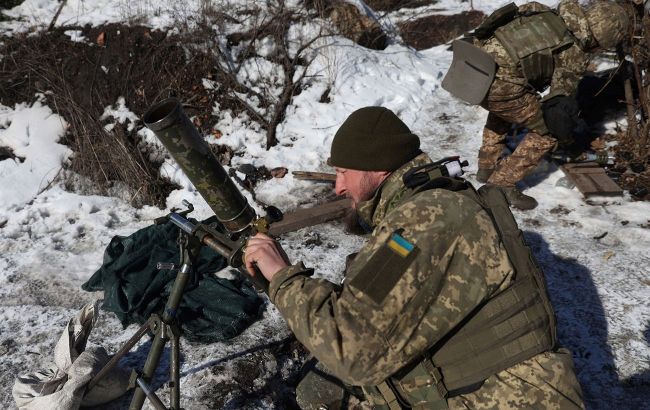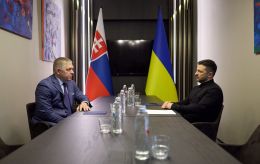U.S. to demand clarification from Zelenskyy on war strategy
 The U.S. demands further war strategy from Zelenskyy (photo: Getty Images)
The U.S. demands further war strategy from Zelenskyy (photo: Getty Images)
The U.S. seeks to enhance Ukraine's implementation of its plan to counter Russian invasion, as the war has been ongoing for the third year. American partners plan to discuss this matter with President Volodymyr Zelenskyy next week during the World Economic Forum in Davos, according to Bloomberg.
The agency notes that this topic with the Ukrainian leader is likely to be raised by Jake Sullivan, the U.S. National Security Advisor. Individuals familiar with the planning, speaking on condition of anonymity, told the edition that American officials in the coming weeks will continue to insist on this topic to discuss undisclosed matters.
A clear strategy is needed
The reason for discussing this issue, according to Bloomberg's sources, is friction and recent issues that have arisen between Washington and Kyiv.
Firstly, over $110 billion in European and American aid remains blocked, and the counteroffensive by the Defense Forces in 2023 failed to achieve a significant breakthrough despite substantial support from American and European weaponry.
Secondly, officials in Washington are concerned that differences between Zelenskyy and the Commander-in-Chief of the Armed Forces of Ukraine, General Valerii Zaluzhnyi slow down efforts to develop a new strategy.
"Allied officials remain hopeful the aid may be released by next month, the people said, though there's no sign of a deal in Washington yet," the statement said.
A source familiar with the matter stated that Ukrainian military officials are currently developing plans for 2024, considering a full range of options. At the same time, the U.S. aims to determine how best to direct its support to help Ukraine defend itself this year.
As a decisive breakthrough in the coming months is unlikely, Ukraine's allies emphasize the crucial importance of developing a clear military strategy to defend current positions and achieve further breakthroughs through Russian defense lines.
Undoubtedly, Kyiv's efforts to make progress on the front are partially hindered by the slow delivery of key weapons, such as long-range missiles and fighter jets, and some allied states are not fulfilling their commitments to provide Ukraine with more weapons and artillery ammunition.
Bloomberg notes that Ukraine's air defense relies on stable deliveries from Western allies. The edition reminds that over the past weeks, Russia has carried out some of the largest missile strikes throughout the entire war. A member of the Group of Seven (G7) noted that Russian President Vladimir Putin may become even bolder after his formal reelection in March.
Military aid for armament has stalled
Sources mentioned by the edition also noted that the United States and their G7 allies are working with Ukraine to finalize long-term bilateral security commitments, which they hope to conclude in February.
"We need to know what their plan is and I'm sure that the administration is pushing for as well. They can't clearly speak to what winning looks like," said Senator Joni Ernst, a Republican from Iowa, on Wednesday, January 10.
The U.S. and Ukraine have previously had differences in views on military strategy. U.S. officials preferred Ukraine to focus last year's counteroffensive on concentrated efforts to break through Russian lines in southern Ukraine rather than stretching its resources across a wider front.
At the same time, official Kyiv and some other allies believe that the correct approach is for the Armed Forces to wear down Russian troops and disrupt their logistics, as the Ukrainian Armed Forces did not have air cover, making it harder for them to carry out a counteroffensive due to personnel losses.
Russian shelling and Ukraine's reinforcement of air defense
After Russia's mass missile attacks on December 29 and January 2, concerns have been raised about Ukraine potentially facing a shortage of ammunition for Western-style air defense systems. The situation is further complicated by the blocking of a new $61 billion funding package for Ukraine by Republicans in the U.S. Congress.
President Volodymyr Zelenskyy recently held a meeting with military commanders, discussing the reinforcement of Ukraine's air defense systems.
During his visit to Lithuania on January 10, Zelenskyy warned that the indecisiveness of allies only increases the courage and strength of Russia. He mentioned that air defense resources are depleting as the aggressor has intensified missile attacks in recent weeks.
Zelenskyy signed a joint statement with Lithuanian President Gitanas Nauseda, emphasizing the need for special attention to support Ukraine with modern air defense systems.
NATO countries pledged to continue assisting Kyiv and enhance Ukraine's air defense systems.

